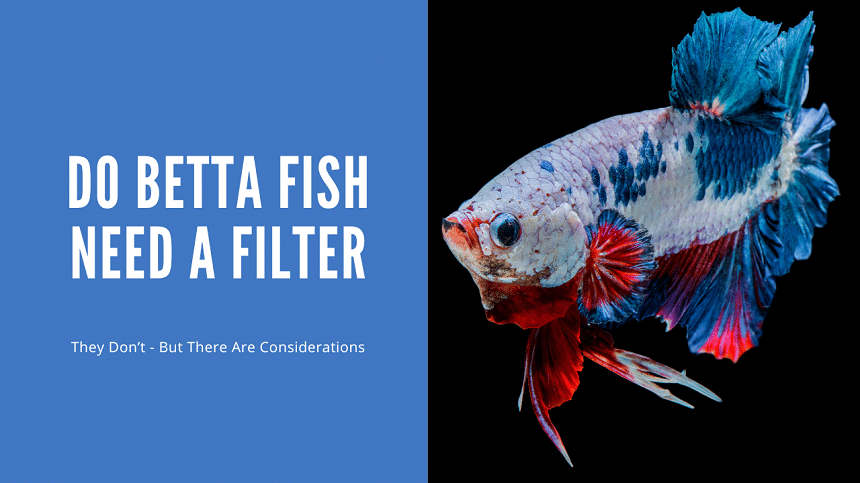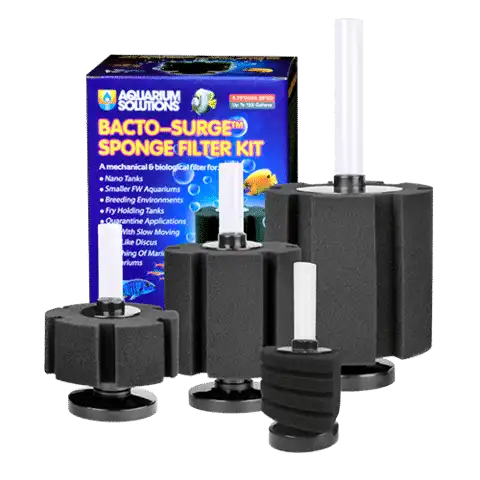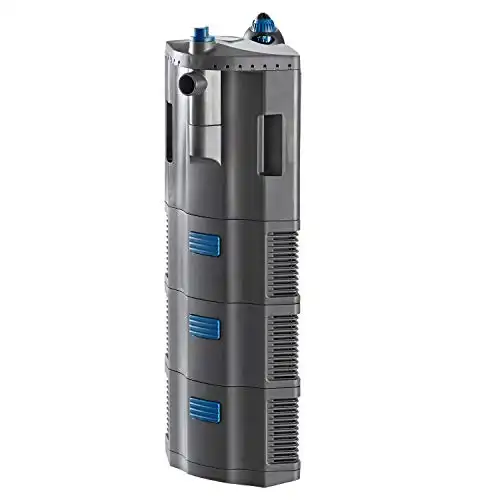Thank you for visiting! By the way… any links on this page that lead to products on Amazon and other stores/partners are affiliate links Aquarium Store Depot earns a commission if you make a purchase.
I get this email or message a lot through my email or YouTube channel. Hobbyists, usually brand new, often tell me about their betta fish and their issues. Often, it stems from poor conditions or a question that all centers around the topic of this blog post.
Do Betta Fish Need A Filter?
My quick answer to this is no – they don’t need one. However, many hobbyists are not able to run a tank filterless nor have the desire to maintain a tank without a filter. Not to mention, many filterless tanks are small and lack other factors that are a must for a Betta, such as a heater.
In today’s article, I’ll provide info on why it’s best to provide a filter for your Betta Fish and, later on will provide a solution as to how to keep a Betta fish without a filter properly. Ready to get started? Let’s dive in!
Key Takeaways
- Betta fish can survive and even thrive without a filter but requires a lot of understanding of advanced methods of natural fishkeeping.
- Consider factors such as tank size, adjustability, and maintenance needs when selecting the right filter for your betta fish.
- Going without a filter requires extra precautions to ensure the cleanliness and stability of the water. It may come with increased risks that should be carefully considered.
Understanding Their Natural Environment
Before we discuss filters, we need to first understand how Bettas live naturally. Bettas naturally live in shallow waters and rarely swim more than 4-5 feet away from their territories throughout their entire lives1.
Knowing this, one may assume that it’s perfectly okay to place these fish in a tiny container and have no filter, considering they live in low oxygen environments. However, there are many things we need to consider here:
- While the territory and swim space are small naturally for a Betta, the availability of shelter is high, with driftwood, plants, and other matter in the water providing excellent cover for them
- Plants, natural bacteria in the tank and soil will care for many of the nutrient issues in the wild
- Bettas thrive in tannin rich waters in the wild, which requires specific setups in captivity
- Nutrient levels are fairly low in native environments for Betta – oxygen is the main lacking factor
In my experience being in this hobby for over 25 years, the vast majority of new aquarium hobbyists lack the desire to keep a natural fish tank (though I will discuss how near the end of this post). In the absence of keeping a natural fish tank, filters are something we must consider in order to maintain stable parameters for our beloved Bettas.
Why We Need Them
When it comes to betta fish care, maintaining a healthy tank environment is essential and filters play an integral role. They are instrumental in eliminating waste from the tank water, enhancing oxygenation, and stimulating the growth of beneficial bacteria for improved water quality. Adding a filter to your betta aquarium can result in several advantages, such as enabling you to have other tropical species living with them while also keeping toxic parameter levels undetectable.
It’s important to remember that these particular fish come originally from shallow rice paddies, which provide slow-moving waters unlike what many other types of tropicals prefer. So selecting the right type of filtering device could make all the difference here – one like air pump powered sponge filters would work best due to its gentleness on both flow rate and ability to filter.
Waste Removal And Water Quality
To ensure proper water quality and waste removal for betta fish, it is important to incorporate a filter into their tank. This can be accomplished with the help of mechanical filtration, which traps particles using various types of media like filter pads, sponges, or gravel (as in the case with under gravel filters).
In combination with mechanical filtration, chemical processes such as activated carbon treatment also support healthy levels by removing substances such as toxins or medications from the environment itself.
Finally, when using a filter specifically made for betta fish’s requirements, you should always practice safe handling practices – making sure filter floss/media replacements occur according to manufacturer instructions and that regular general upkeep takes place on time so toxins don’t leech back in. Consider changing your media sooner if you have an overstocked tank.
Oxygenation And Bacteria Growth
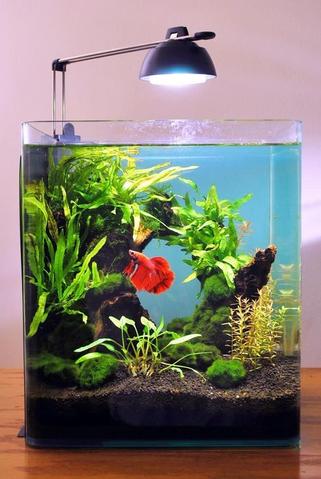
Betta tanks should be kept clean, and filters like sponge filters can help with this process by promoting the growth of bacteria beneficial for biological filtration. This type of bacteria breaks down fish waste via a procedure called the nitrogen cycle into less hazardous substances such as ammonia or nitrites to keep your betta’s habitat safe. It is also important that water flow in their tank doesn’t become static since it prevents air bubbles from forming, which leads to depletion of oxygen levels, something crucial due to betta fishes’ own labyrinth organ not being enough on its own.
Do Betta Fish Need A Filter?
While a Betta fish can live without a filter in the right environment (more on this later), most setups will require a filter for your fish to thrive and maintain good health. Without one, ammonia and nitrite levels can spike, which may lead to stress or even death for these aquatic pets.
Regular water changes as well as tank cleaning, become essential in the absence of a filter due to potentially poor water quality that comes with not having a filter, resulting in stress, sickness, or shorter lifespans for betta fish. Going without a filtration system may seem like an easier option, but this choice exposes your pet fish to more environmental threats than providing them would have been initially thought out.
Filters are highly necessary if you wish to create optimal conditions for your beloved betta. Going without filters usually will require more maintenance care as I describe below.
Increased Maintenance Requirements
Without the aid of a filter, extra work is essential for keeping your betta fish tank clean and healthy. To make sure the water stays ideal for these creatures, it’s necessary to perform frequent changes. With an unfiltered tank in a small container, it is pretty uncommon to change water every 2-3 days.
Manual cleaning must be done on a regular basis in order to dispose of any waste that might lead to adverse effects if left unaddressed.
It can take some time and effort when maintaining an aquarium without using filters. One should consider carefully before deciding between benefits that come with having such equipment versus the increased demand put onto them due to additional upkeep they need do achieve optimal conditions within their betta fish tank.
Potential Health Risks
Having a filtered tank is the best choice for your betta fish to ensure their longevity and health. Without filtration, accumulated ammonia from waste can become toxic in an unfiltered environment, leading to stress as well as illnesses such as fin rot or ich. Exposure to poor water quality due to no filter can reduce the life span of bettas significantly.
By providing adequate filtration, you help remove toxins like ammonia and nitrites. This greatly improve the general health condition of your pet by reducing potential harm caused by bad water chemistry values too high in pollutants that could lead to harmful diseases.
Pros And Cons Of Going Filterless
What are the benefits and drawbacks? As a quick breakdown, here they are:
Cons:
- Increased water changes
- Less tank stability to manage toxic ammonia and nitrites
Here are the pros:
- Saves money
- No need to maintain equipment
Filtration Methods
When it comes to providing a healthy home for your betta fish, there are three filtration methods you should consider: mechanical, biological, and chemical. Each targets different areas of water cleanliness in order to make sure that the environment is safe and suitable for them. Using all three simultaneously can provide optimal results when implemented correctly into your tank setup.
Every aquarium filter outside of a sponge filter has a 3 stage filtration feature, and it is typically what I recommend with my 25 years of experience in the hobby.
Mechanical filters work by filtering out solid debris or waste from the aquarium while beneficial bacteria grow with use of biological filtration, which helps break down any dangerous elements within the habitat, such as harmful chemicals, so they cannot cause harm. Chemical media like activated carbon on its own works too – trapping toxins in order to keep overall water quality balanced inside your betta’s tank system.
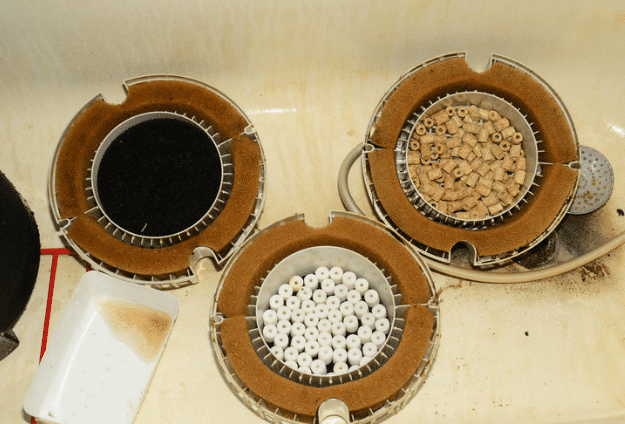
Mechanical Filtration
We discussed mechanical filtration earlier in this post and now we can dive into it more in this section. Mechancial filter works by trapping debris from the water column with pads, floss, or sponges. It is important to note that this mechanical filtration is not effective unless you clean or replace the mechanical filtration regularly. The debris will continue to stay in the tank trapped and will continue to break down into harmful substances like ammonia until you clean it out.
Some filters, like Marineland and Tetra filters, will have a cartridge system that will combine both mechanical and chemical filtration. While this seems convenient at first, long term, it can be expensive. I recommend going with a filter that has separate mechanical and chemical filtration sections.
Chemical Filtration
Chemical filtration is one of the most controversial filtration methods that you will often see talked about on forums and discussion groups. I have mixed beliefs on it and believe that it has it’s place for many applications.
Chemical filtration is designed to absorb harmful chemicals and remove odor and discoloration in the tank. On the surface, this shows great; however, in some circumstances, it’s not the best.
For example, if you have a heavily planted tank carbon can remove trace elements and may require you to change water or fertilize more often. It will also remove medications used so it should be used in a hospital tank.
Carbon also doesn’t last forever. Usually, 3-4 weeks is the average lifespan before you will need to replace it. Use carbon when you want to :
- Remove odors
- If you desire a clear looking tank
- If you concerned about outside environmental factors around your tank, like sprays getting into the tank
Avoid carbon if:
- You need to medicate a tank
- Have a heavily planted tank and running with infrequent water changes
- Want to run a tannin heavy tank
When keeping betta fish, I believe it’s beneficial to run carbon for them as tanks are small, and it helps keep the tank fresh and clear looking.
Biological Filtration
Biological filter media is an important aspect in making sure betta fish live in a good environment. Beneficial bacteria, that can breakdown toxins like ammonia and nitrites through the nitrogen cycle process are enabled to grow due to the surface media provided in biological chambers of filters. This means your aquarium’s water quality will be kept clean for your finned friend.
Biological filtration cannot do all of the work on its own when it comes to ensuring top tier conditions for keeping them happy and healthy. Both mechanical and chemical methods need to merge together with this solution so that you can establish the best tank conditions possible for your fish!
Types Suitable
When setting up a betta tank, it is essential to choose the right filter for your particular needs. Hang-on-back (HOB), internal aquarium, sponge and canister filters are all viable options that come with their own pros and cons.
Before making an informed decision on which type of filtration would be best suited to provide your betta fish’s unique environment with adequate filtration, water flow as well as overall maintenance requirements. Keep in mind that they require peaceful aquatic conditions without strong currents or high levels of agitation from powerful pumps/filters etc.
By understanding the various types available for use in betta tanks, we can create safe environments where our beloved pets will thrive happily while being provided maximum health benefits from proper filtering systems that suit their individual habits & lifestyles perfectly!
Hang-On-Back (HOB)
HOB filters (AKA power filters) are a great choice for betta tanks because of their practicality, convenience and efficiency. These kinds of filters offer several benefits: they hang on the outside wall or back side of your aquarium so that it doesn’t take up extra space inside, installing them is simple enough to do as well as maintain, chemical filtrations paired with mechanical ones makes these types effective at eliminating impurities from water. Adjustable flow rates can be set according to whatever suits best for the particular fish species in question such as betta fishes.
Don’t forget that regular maintenance plus replacing cartridges regularly will ensure that HOB filter functions properly all through its lifetime usage time. It’s significant, though, to look out and make sure there won’t create strong currents which may likely cause harm or stress out any type of aquatic creature, including our beloved betta fishes – if this happens, try making some changes by covering the intake valve via an aquarium sponge in order reduce output pressure coming from Filters themselves accordingly.
A HOB filter should have a sponge put on the intake to prevent your fish from being sucked into the filter. Consider also setting your filter to one of the lower settings to keep the water calm.
Sponge Filters
Betta fish tanks require gentle filtration, and that’s why sponge filters are the perfect choice for them. These aquarium filters can provide both mechanical as well biological filtering, which is suitable even in breeding or quarantine habitats of betta fishes.
Though effective with smaller tanks, when it comes to bigger ones with multiple inhabitants, these may not offer adequate filtration. Some sponge filters can offer chemical media sections, though I would consider another filter type instead of purchasing these.
The Best Sponge Filter
With a name brand and high quality reputation, the Bacto Surge separates itself from the pack
To ensure its proper functioning, you’ll need to rinse the filter sponges weekly or bi weekly by using water from within the tank itself. Sponge filters are a great option because they won’t suck up your fish and will keep a calm current in the tank.
Internal Filters
When looking for an internal filter for betta tanks, it is important to consider the tank size and capacity of the filter. These filters attach to the sides using suction cups and provide a combination of mechanical filtration and biological surface area. Though they offer many benefits in terms of versatility, their use may take up valuable space within your aquariums that need more frequent cleaning than other types do. I personally do not use internal filters that often in tanks that I have setup in the past. If I did, the only internal filter I would use would be OASE’s since I can place a heater inside of it.
The Best Internal Filter
The OASE Bioplus is an internal version of the Biomaster Therm. It's the only internal filter I trust in aquascapes
Canisters
Canister filters are well suited for larger betta tanks or planted tanks, as they have the capacity to deal with a higher volume of water while providing thorough filtration. This type of filter is placed outside the aquarium and works by pumping water into it which then passes through its filtering media. Though efficient in managing high quality water parameters, canister filters come at an extra cost with more maintenance required than other types of filters.
The other issue that I have seen happen is that canister filters are designed for higher output than other filters. I have seen Betta’s get sucked up by the intakes as a result or get stressed by the water flow in the tank. You can resolve the intake issue with a sponge on the intake and you can resolve the flow by lowering the flow and using a spray outlet to defuse the flow.
Choosing The Right One
Choosing the right filter for your betta tank is important to keep your fish healthy and content. The size of the tank, ease of maintenance, flow rate adjustment options should all be considered when selecting a filter. If possible opt out in favor of one that allows you to maintain proper water quality while avoiding strong currents which may stress out or even hurt the betta fish.
The frequency with which filters need cleaning as well as their cartridge replacement requirements, have to taken into account too. Ultimately though it’s vital that whatever decision is made accounts for its impact on providing an optimal environment specifically tailored towards keeping these creatures happy and alive for years!
Adjustability And Flow Rate
When planning the home of your betta fish, having a filter with adjustable water flow rates is essential. High-velocity currents generated by fixed speed filters can be damaging to these creatures and cause health problems that may reduce their lifespan. To guarantee they will live long and happily, you must equip their tank with a device which allows for adjustments in order to create an environment suitable for them – slow flowing waters being ideal.
Maintenance And Replacement Requirements
When deciding on the filter for your betta tank, keep in mind that different types require varying levels of care and maintenance. This could involve frequent cleaning or changing cartridges, which may be demanding to carry out regularly. Consider if you will have enough time available for these upkeep requirements when selecting a filter before installing it in the aquarium. Generally, the more advanced the filter, the more maintenance it will require to keep running.
Going The Filterless Route
Yes, you can run a Betta tank without an aquarium filter. However, it’s not easy. It requires a very specific setup and knowledge of how to grow and keep live aquarium plants. Here is how we do it:
- We will need an active substrate that will serve as a beneficial bacteria bed for our tank
- We will need to acquire easy to care for, fast growing, plants that can overwhelm algae growth
- You will want to have a heavily planted tank. Light planting will not be enough
- We will need to understand fertilizers and dose our aquarium – especially if we don’t plan on changing water
Walstad Method
In order to do this correctly, you will need to understand the principles of running a natural tank. The most well known method for a natural tank is known as the Walstad Method. This involves setting up a heavily planted tank using organic potting soil and capping it with a 1″ layer of sand.
I will do an article on the Walstad Method, breaking it down further in the future. Here are some plants that are great candidates:
- Java Fern
- Hornwort
- Bucephalandra
- Water Lettuce
- Bacopa
The betta fish is the perfect fish to have for a natural based tank so you are in luck. With their hardy nature and ability to breathe air outside of the tank they adapt well to a no filter environment.
The Father Fish Method
Another route to try is what is now called the Father Fish Method. Father Fish is an aquarium influencer with over 50 years in the hobby and a big believer in natural aquariums. He utilizes a modified Walstad Method that improved on the deficiencies of the Walstad. Definitely give him a follow on YouTube if you want to learn more about his approach. I am admittingly a more traditional aquarium keeper like my peers Cory and GreenAqua. However, Father Fish is a great resource of information and provides some hard hitting truths and mythbusting.
Although some may assume this option is cheaper and takes less work, there are potential problems such as stress induced illnesses and death if you mess up the setup. This is why I advocate research if you are going the no filter route.
One con to both of these methods is that the aesthetics of the tank bottom can be unsightly for some. More traditional aquascapes favor a more aesthetically pleasing presentation over the natural tank setup. If you don’t want to deal with the hassle of setup or want the aesthetics, consider doing a hybrid with a filter and hardy plants that are column feeders or going all in with carpet plants in a larger aquascape setup.
Frequently Asked Questions
How long can betta fish go without a filter?
Betta fish can live without a filter as long as the ammonia and nitrite levels stay undetectable or low. Assuming that this isn’t the case, most bettas will tolerate the high concentrates for about a week or two until they are overwhelmed by ammonia or nitrate posing. This is why I stated earlier that aquariums without a filter or plants need to be changed every 3-4 days too keep levels liveable.
Do betta fish need a filter and air pump?
When it comes to a betta aquarium, a filter is usually necessary – an air pump though isn’t necessarily so. It can be beneficial without one present in the tank. Having one is not required. You actually get both with a sponge filter (otherwise known as an air pump filter).
Do betta fish need anything in their water?
Betta fish need tap water that has been filtered to remove chlorine and other metals. Betta need trace elements in their water for survival so using pure distilled water should be avoided as it doesn’t contain these elements
What does a betta need in a tank?
Bettas require a filter, heater and a 5 gallon tank to thrive. 10 gallons is the ideal size if you are considering other tankmates. The setup should be in an area without too much foot traffic away from direct sunlight or drafts close by a power source. Some decor is required, either silk based or live. Driftwood can be used, but sharp edges need to be sanded down.
What types of filters are suitable for betta fish tanks?
HOB, internal aquarium, sponge, and canister filters are all excellent choices for betta fish tanks. These provide a great way to keep the environment safe and healthy so that your beloved betta has an enjoyable home. As long as the intake is covered with a sponge and the flow is modified to suit the betta, you should be good to go.
Closing Thoughts
For your betta’s optimum health, it is essential to keep their environment clean and healthy. A filter plays an important role in sustaining water quality as well as fostering the growth of beneficial bacteria for a thriving habitat. While they can exist without one, it carries greater demands when caring for them, possibly putting their longevity at risk.
Now I know several of my readers will want to debate me on this topic and I’m completely open to it. Have you keep your betta without a filter? Let me know in the comments below and let’s discuss. This is one of the more debated topics on the internet and I’m happy to debate and learn from you.
- About the Author
- Latest Posts
I’m thrilled that you found Aquarium Store Depot! Here you’ll find information on fish, aquariums, and all things aquatics related. I’m a hobbyist (being doing this since I was 11) and here to help other hobbyists thrive with their aquariums! I adhere to a high quality Editorial Process and Review products with real life field usage and practical analysis.

